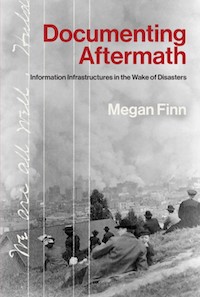 Information School Assistant Professor Megan Finn has published a new book titled “Documenting Aftermath: Information Infrastructures in the Wake of Disasters.” Released this month, the book examines how evolving public information structures have shaped people’s experience of natural disasters over time.
Information School Assistant Professor Megan Finn has published a new book titled “Documenting Aftermath: Information Infrastructures in the Wake of Disasters.” Released this month, the book examines how evolving public information structures have shaped people’s experience of natural disasters over time.
In “Documenting Aftermath,” Finn looks at post-disaster information and communication practices in three earthquake events that took place in northern California: the 1868 Hayward Fault earthquake, the 1906 San Francisco earthquake and fire, and the 1989 Loma Prieta earthquake. She also examines the public information infrastructures that are in place, if an earthquake were to happen today.
“The institutions and technologies that structure the flow of information during and after a crisis can influence how we act in, experience and remember a natural disaster,” argues Finn. “After a disaster is when people most need information, but it is also when their typical means of communicating are broken. One of the areas I find most fascinating is how people reconstruct information infrastructures after disasters.”
While “Documenting Aftermath” focuses on earthquakes in northern California, her research has wide applications to other kinds of events. Finn has written extensively about crisis informatics, focusing on the use of social media after disasters as well as disaster-related information practices at the United Nations. She developed this research interest after witnessing the breakdown in information infrastructure during and after Hurricane Katrina, and the devastating effects of this on people’s lives.
This personal connection to Finn’s research is shared by Ronald Day, professor of Information and Library Science at Indiana University.
“Having experienced the 1989 Loma Prieta, I can testify that we experience earthquakes through information infrastructures in the buildings we inhabit, the roads that we drive on, the panic and emergency responses that occur, and images and news of 'the event,’” declares Day. “[Documenting Aftermath] is a fascinating and revealing book on the different 'information orders' in the past 150 years that have prepared us, explained to us, and have otherwise filled in these imminent upheavals, which lie beneath our feet and haunt our everyday lives.”
Finn teaches information policy and ethics courses at the UW iSchool. She is also involved in a number of collaborations to examine the role of social media and scientific data in emergencies. Her new research examines the development of ethical practices associated with computing technologies.
“Documenting Aftermath: Information Infrastructures in the Wake of Disasters,” published by MIT Press, is available in hardcover or e-book for $39.